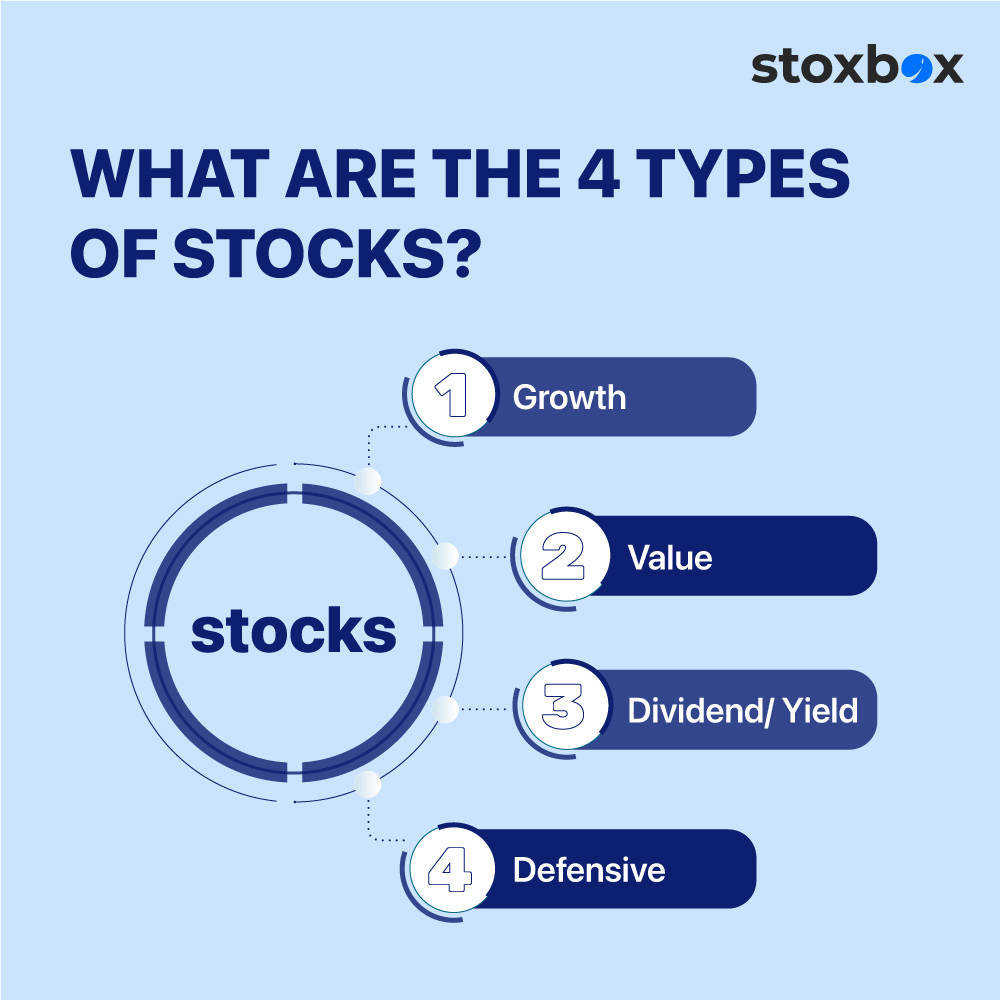Confused in which type of stock to invest learn here to know about different type of stocks
Table of Contents
When you first start learning about the stock market, you quickly realize that buying stocks (also called equities) means you’re purchasing a small piece of a company. Each unit of stock is known as a share. If you’re serious about growing your wealth, adding stocks to your investment portfolio is a good idea. Stocks tend to offer high returns, which can really boost your investment. While they can be risky, if you do your research and understand the market, you can find stocks that offer good returns without too much risk.
So, what are the types of stocks you should consider? Let’s break them down and see why each one is important for your investment strategy.
Types of Stocks

The golden rule of investing is asset allocation. When you invest in these four types of stocks, you’ll diversify your portfolio and reduce risk. Here are the four types of stocks you should consider:
Growth Stocks
Growth stocks are all about companies that are expanding fast. These stocks can help you grow your capital over time, but they don’t usually pay out dividends (the company’s profits). Instead, the company reinvests its earnings to fuel further growth. These companies tend to outperform others in their industry. For example, in India, Adani Greens, Bajaj Finance, and JSW Steel are considered growth stocks. The idea is to hold onto them for a long time to see substantial returns. It’s usually best to buy during market dips for maximum gains.
Value Stocks
Value stocks are from companies with strong financials but are currently undervalued. This could be because of market conditions or other temporary reasons. When the market picks up, these stocks can see a sharp rise in price, offering you a nice return on your investment. To find value stocks, you need to stay updated on the market and look for solid companies at a discount. In India, examples of value stocks include IT giants like TCS and Infosys, as well as Tata Steel.
Dividend/Yield Stocks
If you’re looking for regular income from your investments, dividend stocks are your go-to. These stocks pay out dividends regularly based on the company’s profits. Such companies tend to perform well in both bull and bear markets. When buying dividend stocks, focus on those that have a high yield and a stable business. Popular dividend stocks in India include REC, PFC, and HUDCO.
Defensive Stocks
Lastly, defensive stocks offer stability. These stocks don’t lose much value even when the market crashes, so they help keep your portfolio steady. Defensive stocks come from industries that people rely on all year round, like utilities and consumer staples. These stocks provide consistent dividends and remain stable, even in tough market conditions. Examples in India include Hindustan Unilever, ITC, and NTPC.
Common Stocks
Common stocks represent basic ownership in a company. When you buy one, you become a shareholder with voting rights, giving you a say in key company decisions like electing the board of directors. These stocks offer the potential for capital gains if the company performs well, and sometimes pay dividends, but there’s no guarantee. If the company goes bankrupt, common shareholders are last in line to receive any payout. In India, most stocks traded on NSE or BSE, like Reliance or Infosys – are common stocks.
Preferred Stocks
Preferred stocks are a mix between regular stocks and bonds. They don’t offer voting rights, but they do come with a fixed dividend payout, usually more stable than common stock dividends. Plus, preferred shareholders have priority over common shareholders if the company faces liquidation. These stocks are ideal for investors looking for steady income with lower volatility, but they typically offer less price growth. While not as commonly traded as common stocks in India, some NBFCs and banks issue preferred shares.
Now that you know the types of stocks to invest in, you can start building a diversified portfolio that balances risk and reward.
How to Choose the Right Type of Stock for You
Assess Your Financial Goals
Are you aiming for long-term growth or steady income? Growth stocks are better for capital appreciation, while dividend stocks offer more consistent returns. Also, think about your time frame. Long-term investors might take on more risk with growth stocks, while short-term investors may prefer the stability of value or dividend-paying stocks.
Understand Your Risk Tolerance
Are you okay with taking risks for higher rewards? If so, growth stocks might be a good choice. If you prefer more stability, value or dividend stocks could be more your speed.
Consider Your Strategy
Diversifying your portfolio is key. By balancing growth, value, and dividend stocks, you can reduce risk. If regular income is your goal, prioritize dividend-paying stocks.
Align Stock Type with Investment Horizon
Looking for quick gains? Growth stocks might suit you. For long-term investments or retirement, value and dividend stocks are more stable and reliable.
Use Stock Selection Tools
Use stock screeners to filter stocks based on your preferences. If you’re not sure where to start, a financial advisor can help guide you.
Frequently Asked Questions
What’s the difference between growth stocks and dividend stocks?
Growth stocks focus on capital growth, and they don’t usually pay dividends. Dividend stocks, on the other hand, provide regular payouts to shareholders.
Is it better to invest in common stocks or preferred stocks?
Common stocks offer voting rights and potential for price appreciation but come with more risk. Preferred stocks don’t offer voting rights but pay regular dividends and are considered more stable.
Can I change my stock strategy over time?
Absolutely! As your financial situation or goals change, so can your strategy. For example, younger investors may focus on growth stocks, while older investors nearing retirement may prefer value or dividend stocks for stability.
What are cyclical stocks?
Cyclical stocks perform well when the economy is doing well but can fall during a recession. If you’re okay with market ups and downs, these can offer growth opportunities tied to economic cycles.
How does the P/E ratio affect stock selection?
The P/E ratio helps investors figure out whether a stock is undervalued or overvalued. A lower P/E might signal a value stock, while a higher one could point to a growth stock. Always compare it to industry averages.
How do market conditions affect stock selection?
In a rising (bull) market, growth stocks tend to perform better. In a falling (bear) market, value and dividend stocks are often preferred for their stability. Your stock choice can depend on current market trends.
Your Wealth-Building Journey Starts Here

You might also Like.
No posts found!
